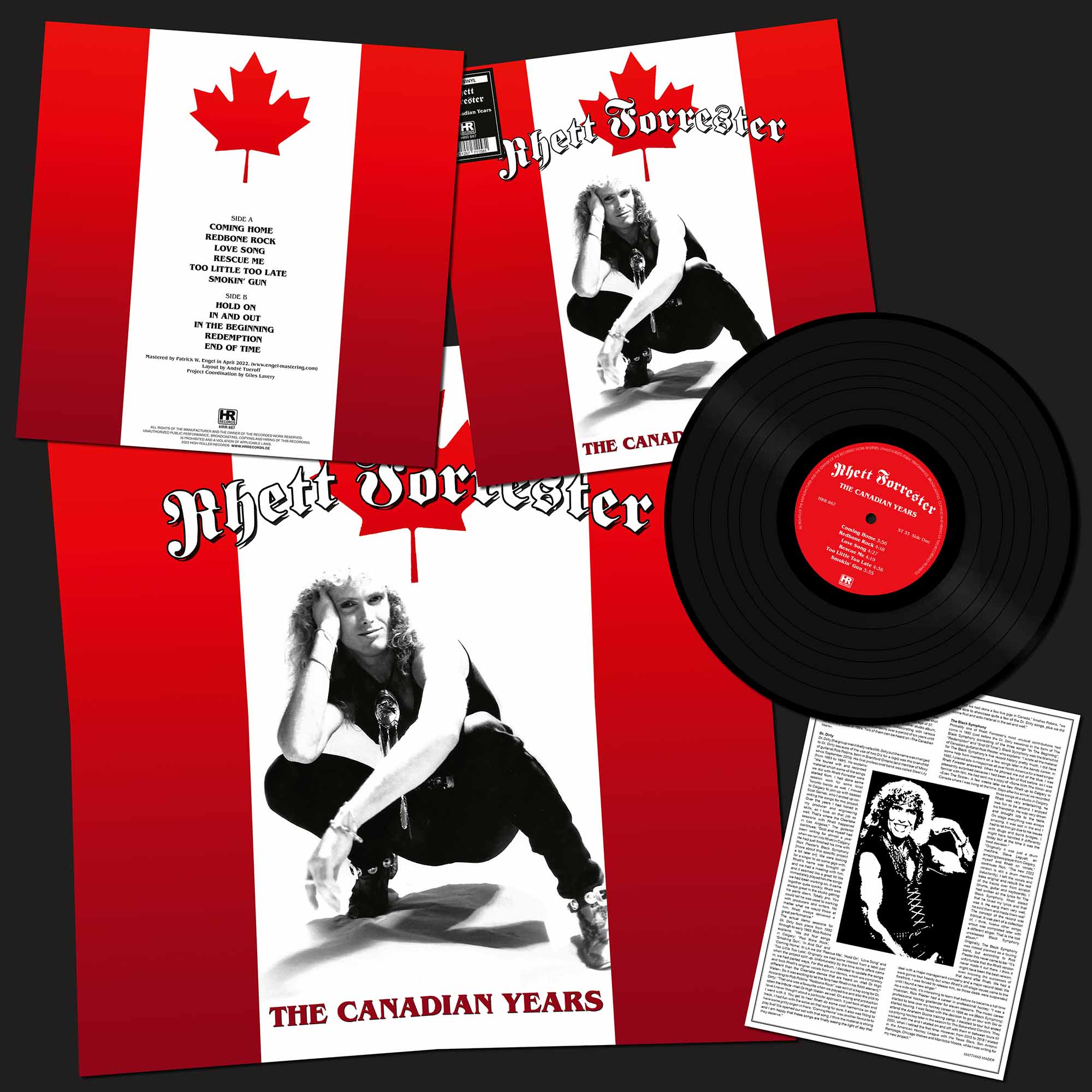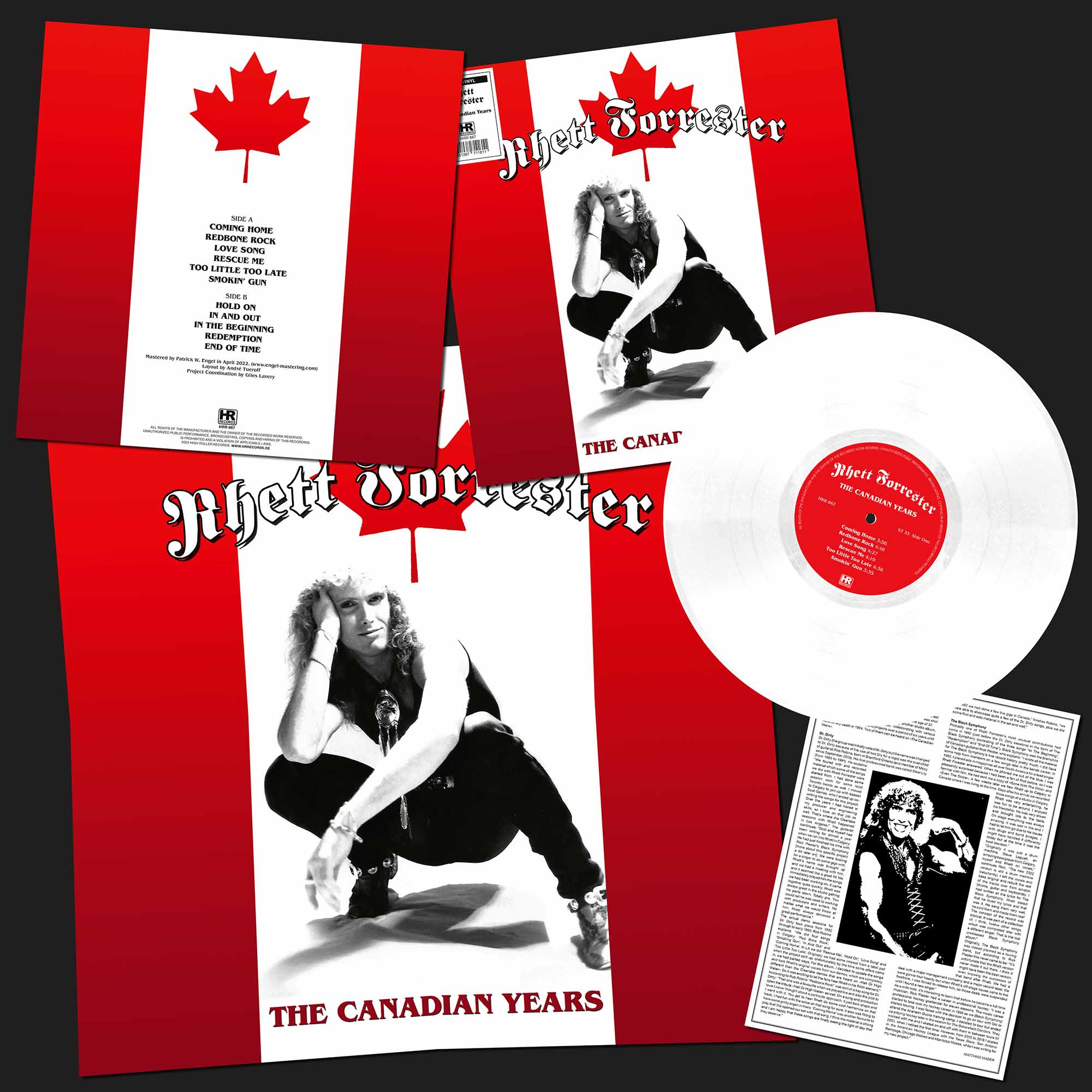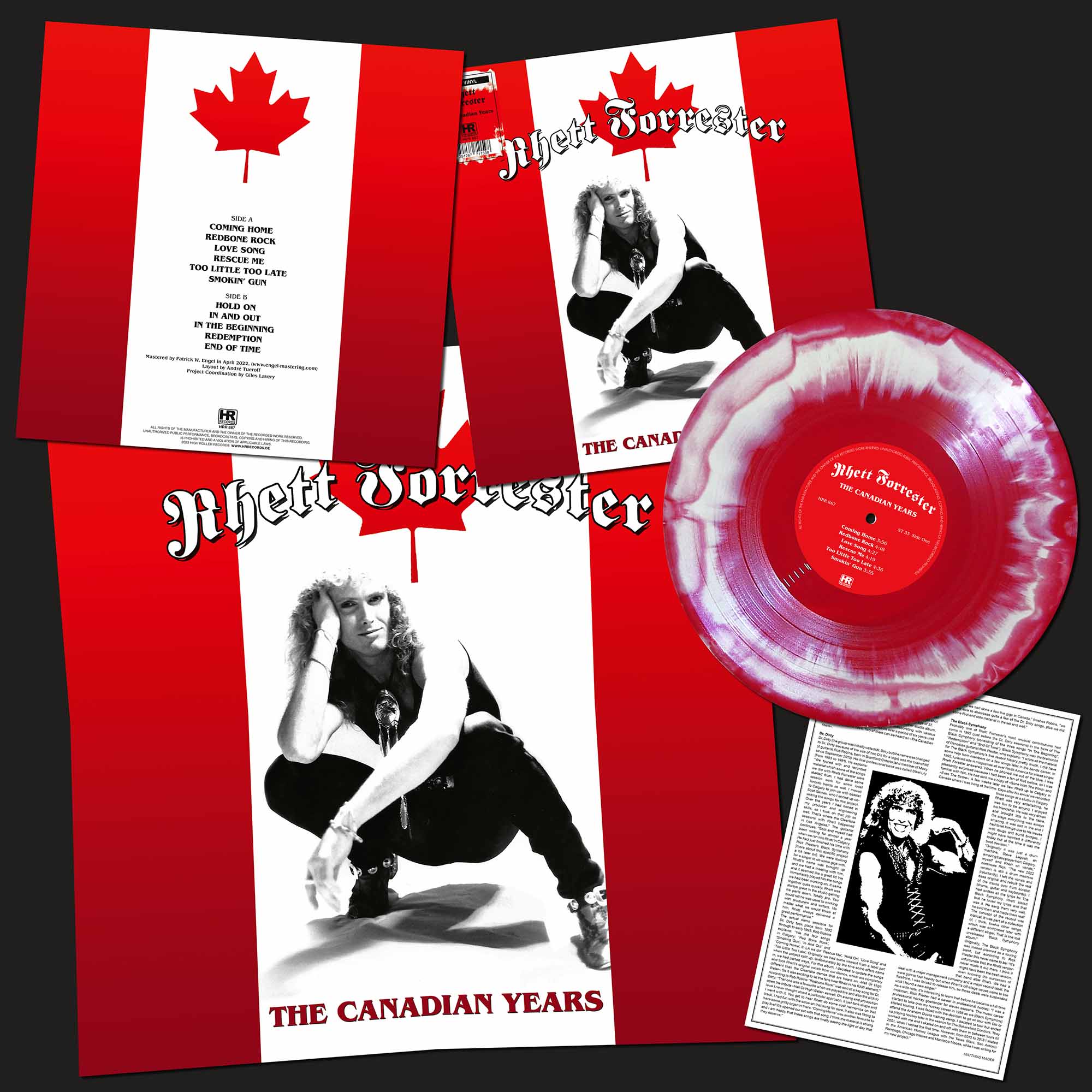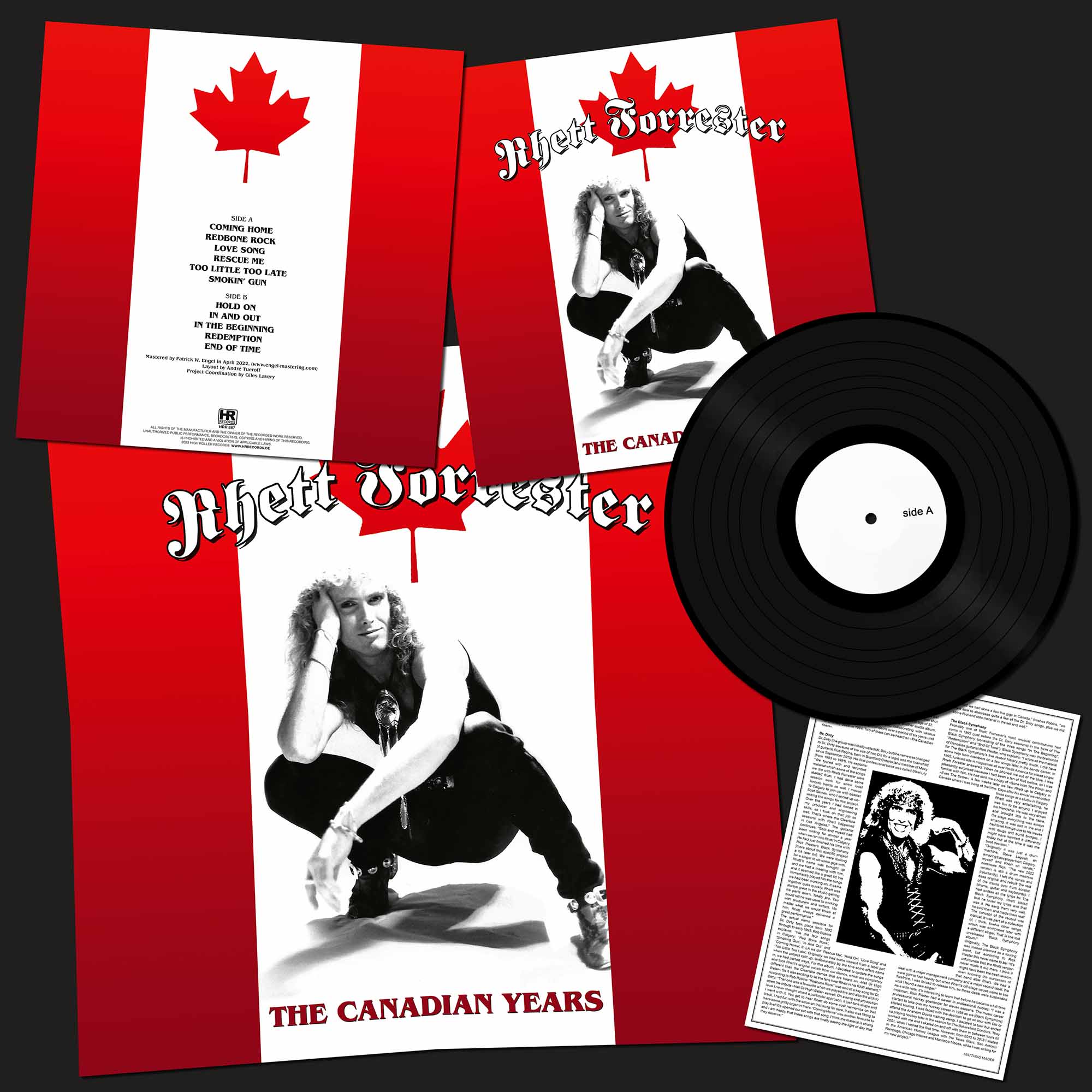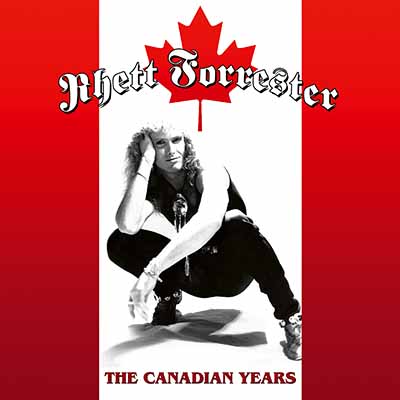 | ||||
| RHETT FORRESTER - The Canadian Years LP | |
HRR 867, ltd 750, 250 x black, 300 x white + 200 x red/ white mixed vinyl, A4 insert, poster, 425gsm heavy cardboard cover | |
| (Dr. Dirty Sessions) 01 Coming Home 02 Redbone Rock 03 Love Song 04 Rescue Me 05 Too Little too Late 06 Smokin' Gun 07 Hold on 08 In and Out (Black Symphony Sessions) 09 In the Beginning 10 Redemption 11 End of Time | |
AVAILABLE | |
Mastered by Patrick W. Engel in April 2022. (www.engel-mastering.com)
When the late great Rhett Forrester left New York’s Riot after their well received 1983 »Born In America« album, it did not take too long for him to start work on his first solo record. »Gone With The Wind« was originally issued on French label Bernett Records in 1984. »Even The Score« from 1988 was the second and last official solo album by Rhett Forrester as the legendary singer was shot and killed in Atlanta, Georgia, on January 22nd 1994 at the age of 37.
Although »Even The Score« was not followed by another studio album, Rhett did not stop recording new music, collaborating with various musicians in different bands and projects over a period of six years until his untimely death in 1994. Two of them can be heard on »The Canadian Years«.
Dr. Dirty
Dr. Dirty (the group was initially called Mr. Dirty but the name was changed to Dr. Dirty because of the use of two D’s for a logo) was the brainchild of guitarist Rob Robbins, born in Brantford Ontario (and member of Moxy since September 2013). His first professional band was called Steel Lily (from 1983 to 1991). He explains: “We toured with and recorded material which some of the songs we did with Rhett Forrester were started from. I had done some session work for some local Toronto bands as well. I moved to Calgary to join up with bassist Scot Gaines, who I ended up co-writing the songs for this project. Over the years I had honed in my producer and engineering skills, so I took on that job as well. That’s where the Clearlake sessions with Rhett happened in Los Angeles.” The guitarist continues: “Scot and myself had been writing for almost a year when we ran into Rhett in Calgary. He had just finished his time with Rick Plester’s Black Symphony [more about this specific project a bit later on">. We were looking for a singer to do some gigs with. Rhett’s name was brought up and we had a meeting with him, and it seemed like a great fit! We immediately played him the songs we had been working on. It came together quite quickly. Rhett was always great in the studio getting his parts down. Totally pro. You could tell he was used to working with producers and writers. No matter what we would throw at him, Rhett always delivered a great performance.”
The actual demo sessions for Dr. Dirty took place from 1992 through to early 1993. Rob Robbins explains: “We did four songs in Calgary: ‘Red Bone Rock’, ‘Smoking Gun’, ‘In And Out’ and ‘Coming Home’. In LA we did ‘Rescue Me’, ‘Hold On’, ‘Love Song’ and ‘Too Little Too Late’. Originally we had some interest from a label just when the project split up. Unfortunately by the time some offers came in, we had parted ways. For this album, I decided to update the songs and took Rhett’s original vocals from our demos, which are completely different than the Clearlake demos that are heard on »Hell Or High Water«. So it was exciting to let the fans hear Rhett in his RAW element.”
According to Rob Robbins “Redbone Rock” was sort of a key song for Dr. Dirty: “That one was a favourite when we played live and also the pick to open the tribute »Hell Or High Water« as well. On a song and production level I never thought about a particular approach. It just took shape and I went with it. You get to hear Rhett do some cool harmonica on that track. I had fun with the solos on that song for sure. It also was fitting to have some gritty organ in there. ‘Coming Home’ was another favourite to play live! We opened our set with that song. I think the material is strong and I am happy that these songs are finally seeing the light of day that they deserve.”
“In 1992 we had done a few live gigs in Canada,” finishes Robins, “we were able to showcase quite a few of the Dr. Dirty songs, plus we did some Riot and solo material in the set and well.”
The Black Symphony
Probably one of Rhett Forrester’s most unusual contributions had come in 1992 (just before the Dr. Dirty sessions) in the form of The Black Symphony (consisting of the three songs “In The Beginning”, “Redemption” and “End Of Time”). Black Symphony was the brainchild of Canadian guitarist Rick Plester, who explains: “I wrote all the material for The Black Symphony’s five record history pretty much, I did have some help from members on a few songs later in the bands career. In 1992, I placed ads in magazines all over North America for a lead singer. Rhett Forester answered. When he phoned me out of the blue, I was pleasantly surprised because I had been a fan of Riot before, so I was familiar with him. He had sent me a copy of »Gone With The Wind« and »Even The Score«. A few weeks later we flew Rhett up to Calgary in Canada where I was living at the time. Days after his arrival we recorded three songs at a studio in Calgary. Rhett was very entertaining, he was fun to be around. I enjoyed his friendship. He was very driven and brought lots to the table. On stage everything was always amazing. It was sad in the end I had to let him go due to his issues with drugs and burnt bridges. I might have handled it differently today but at the time it was the best decision.”
“Originally it was just a drum machine, Steve Legualt, an amazing bass player from Calgary, myself and Rhett on vocals,” continues Rick. “The new 2022 version is still a drum machine (reluctantly). I left the vocals and bass original and rebuilt the rest of the tracks over from scratch (drums, guitar and keyboards). I had written all the lyrics for The Black Symphony. Rhett stated that he loved my lyrics and that was it. He sang them very well, he sold them and made them real! The concept of the record was biblical. It was part of a collection of, I think, twelve other songs, which was completed later with a different singer. That is the lost unreleased Black Symphony album.”
Originally, The Black Symphony was indeed planned as a touring band, but according to Rick Plester this never came to be: “It’s unfortunate that the Rhett version never made it out there. I think it might have been the best version, even knowing the successes of that band after Rhett. We had a deal with a major management company and a major record label. We were gonna tour heavily but when Rhett’s off-stage issues came to the forefront, I was forced to release him, so those deals were suspended until I found a new singer.”
As a side note, it’s interesting to learn that before he became a full-time musician, Rick Plester had a career in professional hockey: “I was a professional hockey goaltender for eleven seasons. The music career started to take over my hockey career in 1998 as we (Black Symphony) started touring. I was faced with the decision to go on tour with Dio or attend the Anaheim Ducks training camp. I decided to tour but ended up playing hockey later in the season for The Bakersfield Condors. They worked with me and I skated on and off with them in between tours till 2001, when I retired the first time. However, from 2013 to 2018 I skated in the American Hockey League with the Texas Stars, San Antonio Rampage, Chicago Wolves and Manitoba Moose, while I was writing for my new project.”
MATTHIAS MADER
